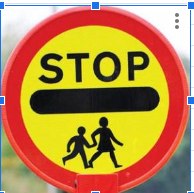The Green Cross Code begins by stopping at the curb. This ensures people stop and analyze traffic before crossing the road. After stopping, pedestrians should look both ways, listen for incoming cars, and wait for a safe break in traffic to cross. The Green Cross Code helps pedestrians cross roads safely and avoid accidents.
JRSO means Junior Road Safety Officer. Junior Road Safety Officers educate and raise awareness of road safety in their school or community. They promote safe driving and road safety activities to reduce accidents and make roads safer.
All drivers must drive safely. Drivers must obey traffic laws and drive safely to protect themselves, their passengers, and other road users. Drivers must practice safe driving to avoid accidents, injuries, and deaths.

Cars must stop at the stop line or before entering the intersection, yield to other vehicles or pedestrians with the right-of-way, and advance only when it is safe. "Halt" signs require drivers to stop at the indicated place or risk traffic violations and safety. Stopping at "stop" signs keeps junctions safe and traffic flowing.
It indicates a pedestrian crossing area on the road where drivers must give to pedestrians. Road safety and pedestrian awareness are promoted by the sign's caution to drivers to look for pedestrians.
On the road stretch where the sign is posted, passing other cars is prohibited. Due to poor sight, narrow roadways, or potential risks, the sign bans cars from passing other vehicles in that area. To improve road safety and avoid unsafe driving, the sign prohibits overtaking in such situations.
It's essential to follow the MSM routine to ensure safe driving and be aware of the road conditions and other vehicles around you. This process helps maintain proper observation, communication, and safe execution of maneuvers while driving.
Advertisement
Drivers must slow down and yield to vehicles in a roundabout. They must check for vehicles on the roundabout, observe traffic flow, and surrender to left-turning traffic before entering. Drivers can safely access the roundabout by slowing down and yielding, ensuring traffic flow. The other options—clockwise, anti-clockwise, or speeding up—can lead to risky circular driving.
As you approach a road marking indicating an abrupt turn, slow down. Reducing speed before entering a curve helps the driver maintain control, maneuver safely, and adapt to unforeseen hazards or road conditions. It keeps drivers safe.
All vehicles, including people, cannot enter. This sign indicates that the road or area is closed to traffic. It provides explicit instructions to enforce traffic laws, prohibit unlawful entrance, and keep the designated area safe and orderly.
One way (right)" signs mean you must drive in the arrow's direction. The arrow on "one-way" signs points right, indicating that traffic must move in one direction. Following one-way signs helps minimize head-on crashes and maintains traffic movement in designated lanes.
Keep left" signs require drivers to drive on the left. This regulatory traffic sign instructs vehicles to stay in the left lane to maintain traffic flow and follow the local traffic laws in countries where driving on the left is the norm. Road safety depends on obeying the "Keep left" sign.
Drivers should not turn right at "No right turn" signs. "No right turn" signs ban right turns at the given intersection or road segment. Drivers obey traffic laws, avoid risky maneuvers, and protect pedestrians by following these signs.
The "Weight limitation (per axle)" sign shows a vehicle's axle weight limit. To prevent large vehicles from damaging roadways, this regulated traffic sign is typically displayed on bridges and roads. Drivers can keep highways and bridges safe and long-lasting by following weight regulations.
Advertisement
Speed restriction (maximum)" signs reflect the area's maximum speed limit. Drivers must follow the speed restriction set by this traffic sign. Following the speed limit improves traffic flow, safety, and accident prevention.
The "No waiting" sign prohibits drivers from stopping. This traffic sign restricts parking or stopping momentarily to improve traffic flow, safety, or avoid impediments. Following the "No waiting" sign keeps traffic moving, reduces congestion, and protects other drivers.